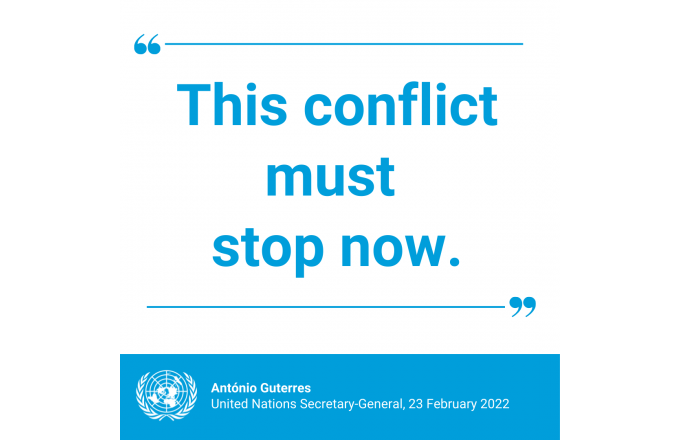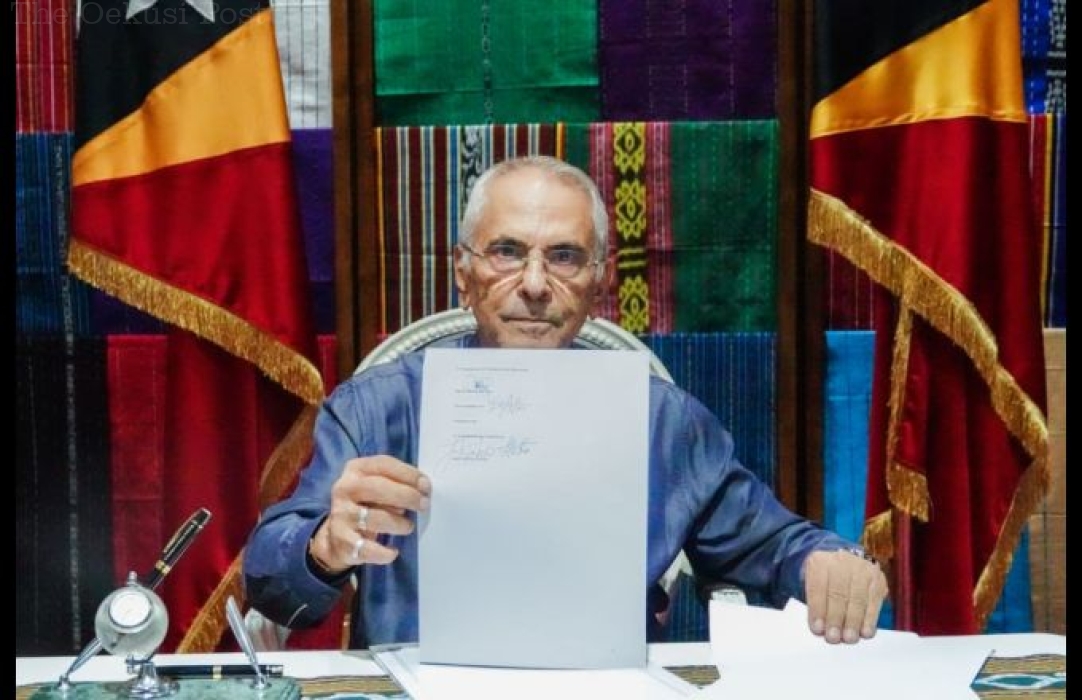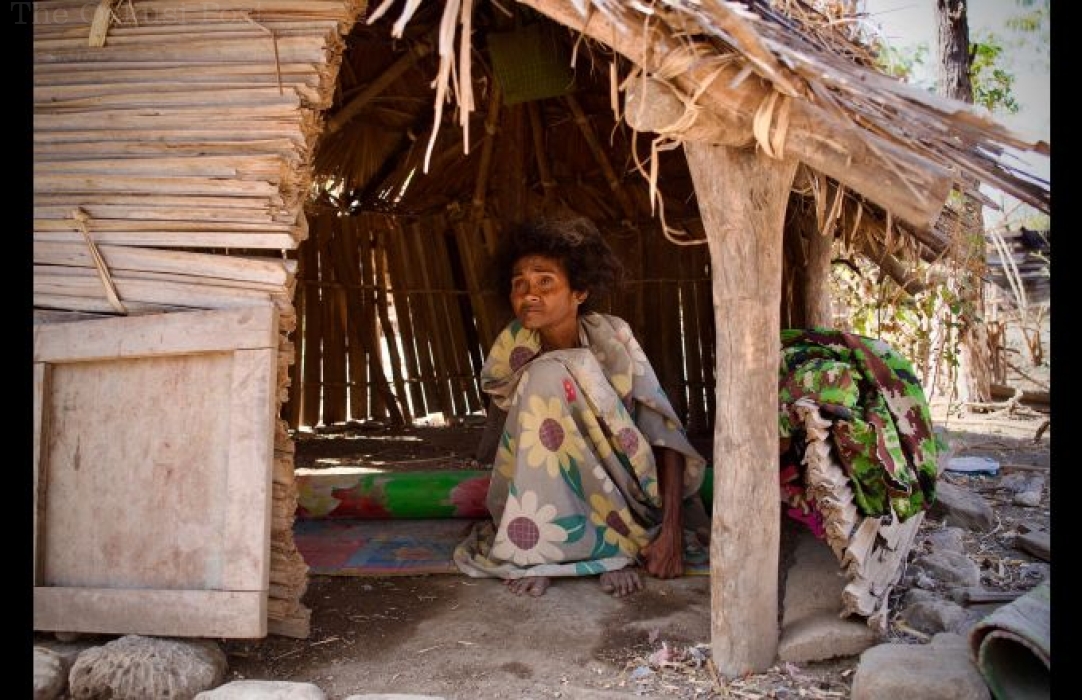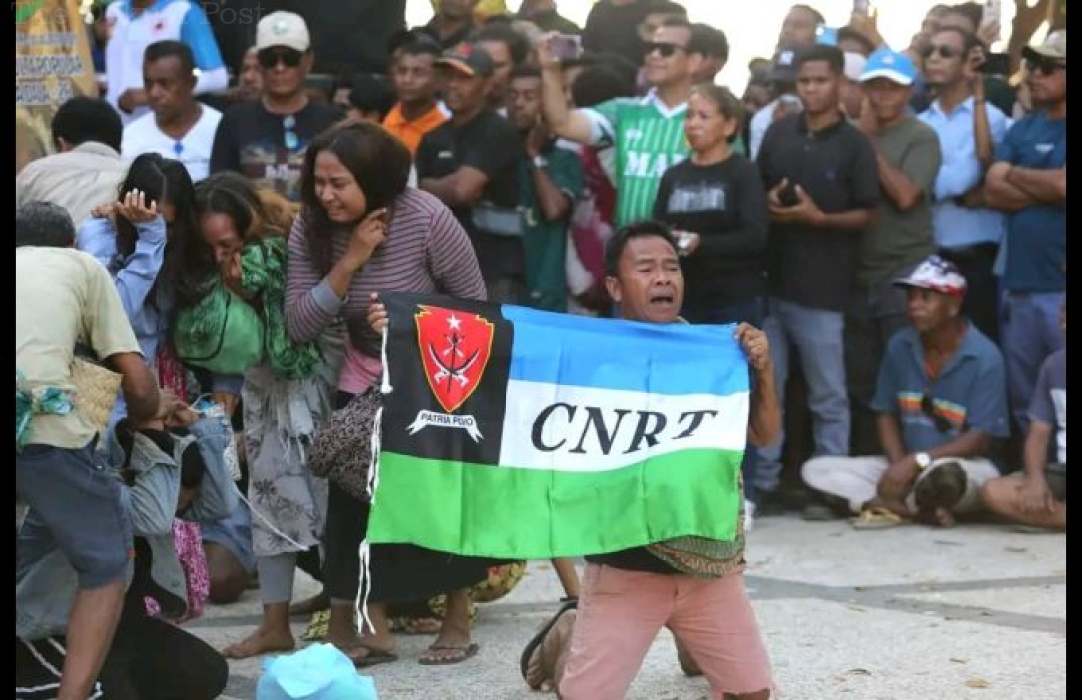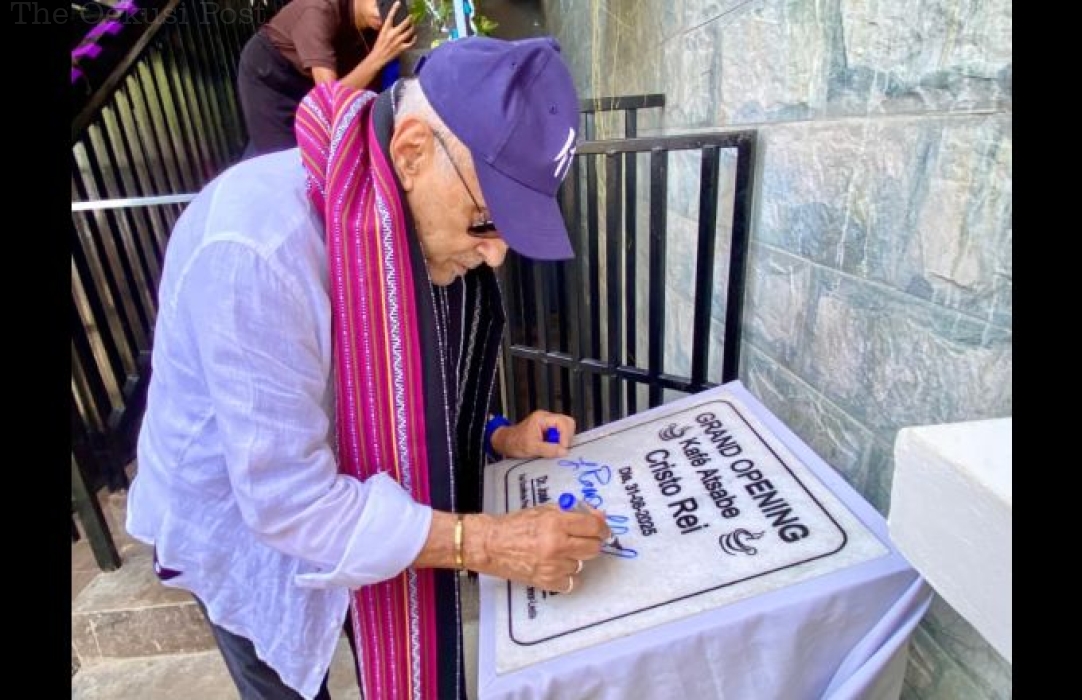DILI (TOP) - "President Putin, in the name of humanity, bring your troops back to Russia. This conflict must stop now." -- UN Secretary-General António Guterres on the developments regarding Ukraine.
“President Putin, stop your troops from attacking Ukraine, give peace a chance,” Secretary-General António Guterres urged Wednesday evening at the start of an emergency meeting of the UN Security Council, the body's second late night session this week.
Hours after speakers took the floor in the 193-member General Assembly to denounce Russia’s actions towards Ukraine and appeal for diplomacy, Mr. Guterres said that instead of repeating what he’d stated there, his political chief would update the Council on “a number of events” that had taken place during the day.
But before handing the microphone to her, he drew attention to rumours that were circulating that an offensive against Ukraine was imminent.
About an hour into the Council meeting, President Putin announced in Moscow that a 'special military operation' in Ukraine's eastern Donbas region had commenced, and that he had asked Ukrainian troops to put down their arms.
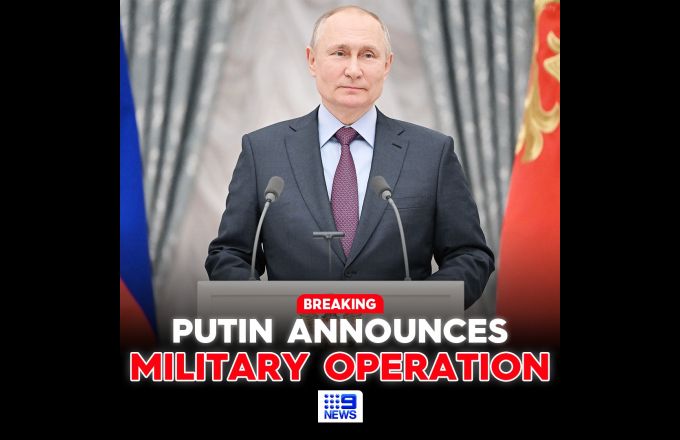
Guterres 'saddest moment'
Speaking to journalists after the Security Council session ended, Mr. Guterres called what happened the “saddest moment” in his tenure as UN Secretary-General.
In light of this development, the UN chief said, “I must change my address and say: In the name of humanity bring your troops back to Russia. In the name of humanity to not start what may be the most devastating war since the start of the century.”
Rapidly unfolding events
Under-Secretary-General for Political and Peacebuilding Affairs Rosemary A. DiCarlo told the Council that earlier in the day, the “so-called authorities of the Donetsk and Luhansk Peoples Republics” had requested military assistance from Russia.
Meanwhile, the Ukrainian authorities declared a nationwide state of emergency and announced other related defence and security measures, including the mobilization of reservists.
“Throughout the day we have seen disturbing reports of continued heavy shelling across the contact line and civilian and military casualties…the repeated targeting of civilian infrastructure…[and] an ongoing large-scale military build-up and military columns moving towards Ukraine,” she said.
Moreover, Russia has also reportedly shut airspace to civilian aircraft near the border with Ukraine.
“The United Nations cannot verify any of these reports, but if these developments were confirmed, they would greatly aggravate an already extremely dangerous situation,” she said.
The Ukrainian authorities are also reporting a new large-scale cyber-attack targeting several State and financial institutions.
Staying and delivering
UN staff remain on the ground to provide humanitarian assistance to the people of Ukraine, Ms. DiCarlo said, adding, “we are committed to staying and delivering”.
“All parties must ensure the safety and security. Respect for international humanitarian law and international human rights law is also paramount”, she stated.
While the world cannot predict what will happen in the coming hours and days ahead, Ms. DiCarlo said that “what is clear is the unacceptably high cost – in human suffering and destruction – of an escalation," concluded the senior UN official.
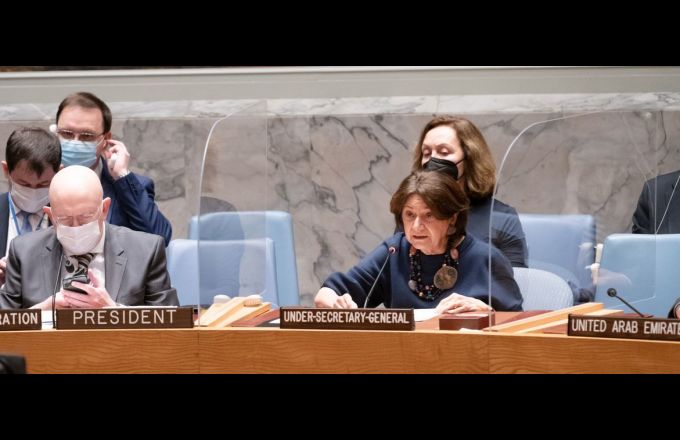
‘Perilous moment’
US Ambassador Linda Thomas-Greenfield said that the meeting was being held tonight because, along with Ukraine, “we believe that a full-scale further invasion is imminent”.
She pointed to the closing of airspace by the Russian authorities, as well as moving troops into Donbas and moving other forces into combat-ready positions.
“This is a perilous moment and we’re here for one reason, and one reason only: to ask Russia to stop. Return to your borders. Send your troops, your tanks, and your planes back to their barracks and hangars. And send your diplomats to the negotiating table. Back away from the brink, before it is too late.”
Ms. Thomas-Greenfield reminded the Council that Russia had called previous predictions “hysterical”, saying that US was "lying and supplying the world with misinformation."
“But what we said would happen has come to pass, for all the world to see,” the US Ambassador spelled out. “We must confront this threat head-on”.
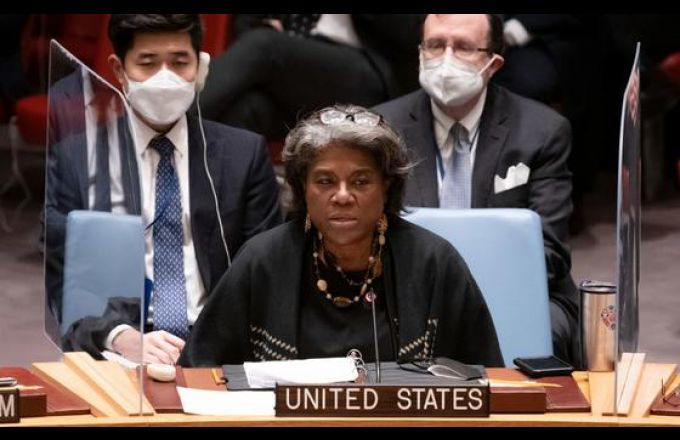
‘Unjustifiable blow’ to peace
French Ambassador Nicolas de Rivière said that Russia was on the verge of provoking chaos in Ukraine and striking “an unjustifiable blow to peace and security in the heart of Europe”.
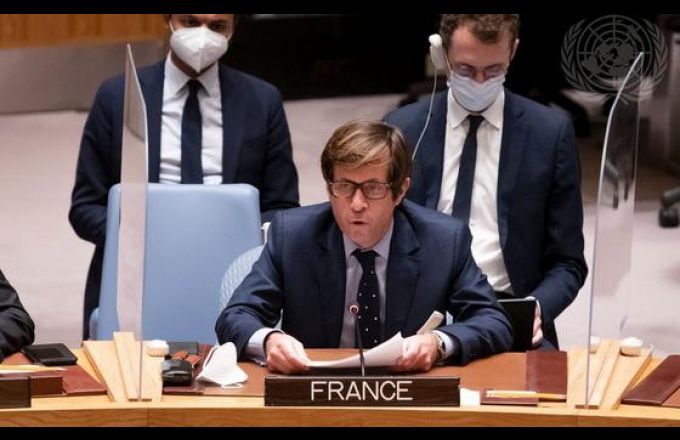
He said that President Putin had been planning this assault for months and had consistently and patiently undermined Ukraine’s sovereignty and territorial integrity.
“Throughout all this, Ukraine has shown remarkable restraint, including restraining from violence,” Mr. de Rivière said.
He reminded that European allies and the United States had consistently expressed commitment to work together with Russia to seek a diplomatic solution and “the international community had made its united voice heard earlier today in the General Assembly, calling for respect for territorial integrity and sovereignty.
The French Ambassador said that “if Russia confirms that its choice is war it will have to take all the responsibility and pay the price.”
‘A gun to Ukraine’s head’
UK Ambassador Dame Barbara Woodward noted that for months, Russia has been holding “a gun to Ukraine’s head”.
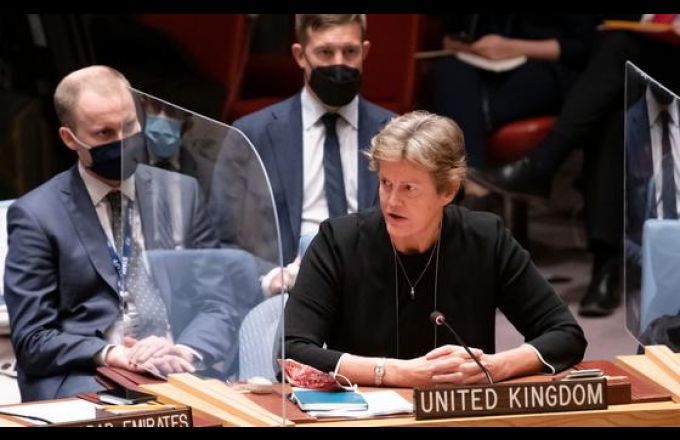
Members of the Security Council, General Assembly, and the Secretary-General himself had been calling for an end to Russia’s aggression.
“The world is calling for peace, but Russia is not listening,” she said.
As such, the United Kingdom, she said, will not compromise its commitment to Ukraine’s sovereignty and territorial integrity.
“We will not compromise our commitment to the purposes and principles of the UN Charter…most of all the founding principle that we live together as good neighbors,” concluded Ms. Woodward.
Root of the crisis
Russian Ambassador Vasily Alekseevich Nebenzya, who is serving as the President of the Council for February, said that after listening to the statements tonight and in recent days, it was difficult to explain intensification of shelling by the Ukrainian regime of civilians by in Donetsk and Luhansk.
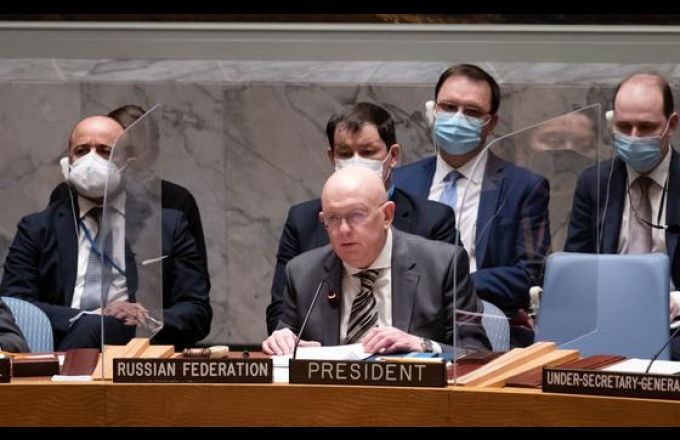
All the speakers seemed not to care for those people “who are living in basements. They seemed not to care about the refugees that are fleeing to Russia,” he said, as if "those four million people simply don’t exist.”
“We tried yesterday and the day before to explain the logic by which Russia recognized the regions in the Donbas, but you just didn’t want to hear it; then or now. The people of the Donbas have been living in fear for the past eight years under Ukraine’s shelling and aggressions,” he said.
The Russian Ambassador stated that “the root of today’s crisis around Ukraine is Ukraine itself, which has for years been undermining the Minsk Agreements and calls for de-escalation”.
He told Council members that he had just learned that President Putin had announced a special military operation in the region, but that was all he knew and would need more time to gather specific information.
“I will keep you appraised of the situation,” he said and added that “occupation of Ukraine is not in our plan, our plan is to protect the people [in the Donbas] from the genocide perpetrated by the regime in Kyiv.”
Too late for de-escalation
Ukrainian Ambassador Sergiy Kyslytsya said that most of his statement was “useless now” after the Russian Ambassador had stated openly from the floor of the Council that President Putin had “declared war on my country”.
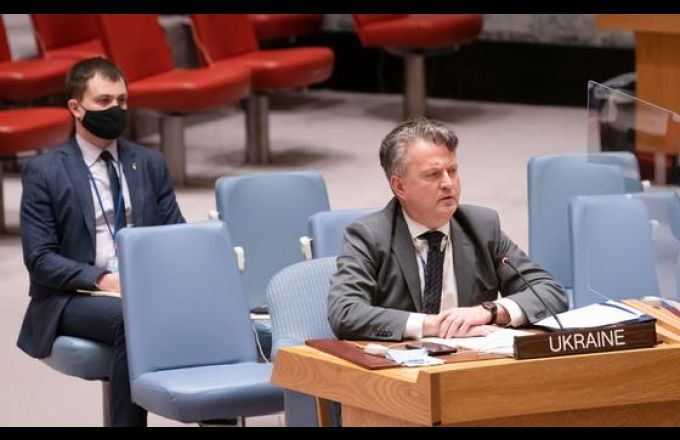
He welcomed the intention of some Council members to submit a resolution condemning aggression against Ukraine, saying “there is no purgatory for war criminals. They go straight to hell.”
Mr. Kyslytsya asked the Russian Ambassador to clarify whether Ukraine was being bombed “at this very moment.”
“It's too late, dear collagues, to speak about de-escalation. Too late. The Russian President declared a war. Should I play the video of your President? You declared a war. It’s responsibility of this body to stop the war”, Mr. Kyslytsya said, directing his comments to Russian Ambassador Nebenzya. “You have a smartphone. You can call” officials in Moscow.
Considering this “declaration of war”, the Ukrainian Ambassador said that the Russian Federation should “relinquish the responsibilities of Council President and transfer them to a responsible member of the Council who... respects the UN Charter."
He also requested that the Secretary-General distribute legal UN memorandums from December 1991, particularly 19 December of that year, including a decision by the Security Council recommending that the Russian Federation be a Member State of the Organization. “It would be a miracle if the Secretariat is able to produce such decisions,” he said.
In the meantime, the Security Council should pause tonight's session to consider all resolutions and recommendations to stop the war.
“I call on every one of you to do everything possible to stop the war,” he concluded.
Before the end of the meeting, several members of the Council took the floor a second time to condemn President Putin's announcement of Russia's so-called “special military operation” in areas of eastern Ukraine.
Russian forces have launched a major assault on Ukraine, firing missiles on cities and military targets.
The invasion by land, air and sea began after a pre-dawn TV address where Russian President Vladimir Putin demanded that Ukraine's military lay down its arms.
Initial reports of casualties included Ukrainian civilians and soldiers, and Russian troops.
Ukraine's leader said his country "won't give up its freedom".
"Russia has embarked on a path of evil, but Ukraine is defending itself," President Volodymyr Zelensky tweeted according to BBC.
Ukraine has declared martial law and severed all diplomatic relations with Russia. It says weapons will be given to anyone who wants them.
In the capital Kyiv, home to almost three million people, warning sirens blared out as traffic queued to leave the city and crowds sought shelter in metro stations. "We don't understand what we should do now," one woman called Svetlana told the BBC. "We're now going to a place where we can be safe and we hope we can leave safely."
Mark, a 27-year-old sales executive, said he was ready to be called up to fight. "We don't have another way," he said.
Several neighbouring countries have begun preparations to take in a large number of refugees. Moldova alone said more than 4,000 people had come over the border from Ukraine.
Thursday's invasion followed weeks of escalating tensions, as Russia massed troops along Ukraine's borders.
The UK, EU and other Western allies have vowed to impose tough new sanctions to punish Moscow, but say they will not send in troops.
"These are among the darkest hours of Europe since the Second World War," EU foreign affairs chief Josep Borrell said.
Dozens of people have been killed, including about 10 civilians. Six died in an air strike in Brovary near the capital Kyiv. A man was also killed in shelling outside the major north-eastern city of Kharkiv.
A Ukrainian presidential adviser said that more than 40 soldiers had died and many more were wounded. Ukraine said it had killed 50 Russian troops and shot down six Russian aircraft, but this has not been verified.
What Russia has targeted.
Mr Zelensky said Russia had positioned almost 200,000 troops and thousands of combat vehicles on Ukraine's borders ahead of Thursday's invasion.
Moscow first struck Ukraine's military infrastructure and border guard units. Then Ukrainian forces said Russian military vehicles had crossed the border near Kharkiv in the north, Luhansk in the east, Russian-annexed Crimea in the south and from Belarus too. Belarus's authoritarian leader Alexander Lukashenko said his country's military were not involved but could be if needed.
Russian tanks were later seen on the outskirts of Kharkiv, a city of 1.4 million people. Russian forces also reportedly landed by sea at Ukraine's major port cities of Odesa on the Black Sea and Mariupol on the internal Sea of Azov.
Much of the fighting appears to be centred around the east.
Residents of Kharkiv, Ukraine's second largest city, say windows in apartment blocks were shaking from constant blasts as the Ukrainian military and Russian forces exchanged shellfire.
But clashes have have also been taking place around the capital Kyiv in the north and the southern ports of Odesa and Mariupol.
Ukraine's army said Kyiv's Boryspil international airport was among a number of airfields that had been bombed, along with military headquarters and warehouses in the big cities of Kyiv, Dnipro, Kharkiv and Mariupol.
Footage verified by the BBC showed missiles slamming into an airport in the western city of Ivano-Frankivsk.
Russia claimed to have destroyed more than 70 military targets.






